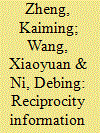|
|
|
Sort Order |
|
|
|
Items / Page
|
|
|
|
|
|
|
| Srl | Item |
| 1 |
ID:
118780


|
|
|
| 2 |
ID:
138910


|
|
|
|
|
| Summary/Abstract |
In this research, linguistics is applied to the study of novels through critical discourse analysis. Critical discourse analysts take into consideration those elements of discourse which are hidden in order to preserve power hierarchy. Clearly contrary to descriptive-formal surveys of language, they contend that language can be used intentionally in order to support dominance, inequality and struggle against them as well. The novel Modir-e Madreseh (The School Principal) by Jalal Al-e Ahmad is analyzed based on Theo Van Leeuwen's research indexes, namely activation and passivation, nomination and categorization, identification and functionalization, personalization and impersonalization. The analysis illustrates how examination of the linguistic form used in the novel leads to deeper knowledge of the author who tries to alleviate people's miseries while they themselves do not play any significant role in doing so.
|
|
|
|
|
|
|
|
|
|
|
|
|
|
|
|
| 3 |
ID:
182766


|
|
|
|
|
| Summary/Abstract |
This paper considers a modified principal-agent environment, where principals can use personalized offers based on agents' reciprocity-related information. With such information, principals can either impose stronger financial incentives or try to “trigger” agents' positive reciprocity by offering a higher fixed rate. Theory suggests that principals who believe in agents' reciprocity would personalize offers so that reciprocal agents increase their effort beyond the self-regarding benchmark. Using a lab experiment, we test the behavior of principals and agents. Our experimental market witnesses significant wage personalization when reciprocity information is available. However, agents' effort levels and principals' payoffs are lower under wage personalization, compared with the sessions where principals cannot personalize offers. Our structural analysis shows that, under wage personalization, agents expect higher fixed wages and reciprocate higher wages less. Information about agents' individual reciprocity is more correlated with the expected wages, rather than the strength of reciprocity toward higher or lower wages. Principals grant higher fixed wages to workers with lower wage expectations, but because principals cannot personalize offers effectively according to the strength of reciprocity, the performance of wage personalization is limited.
|
|
|
|
|
|
|
|
|
|
|
|
|
|
|
|
| 4 |
ID:
193642


|
|
|
|
|
| Summary/Abstract |
This article argues that Thailand’s 2023 parliamentary election was the first election where social media played a decisive factor in the electoral outcomes. Prior to this election, social media was an important campaign tool, but it was unclear whether it made a difference in the electoral results. Based on our original post-election survey data (n = 1,249), social media was the most important media in governing vote choice. Social media was a crucial space for activation and conversion—motivating the undecided to become partisans and converting partisan voters to shift their allegiances. Thailand’s 2023 election was also marked by rising personalization of political campaigning, wherein citizens felt free to decide how and what their political participation would look like, and parties that encouraged inclusive and open engagement with politics were best poised to win in the electoral arena. Drawing on social network analysis of social media data, this article demonstrates how the Move Forward Party’s (MFP) loosely structured and inclusive social media campaigns allowed both their candidates and supporters to mobilize individualized large-scale collective action, in contrast to their rivals who focused on traditional top-down style campaigning. Despite the MFP’s winning social media campaigning that produced electoral victories, the party was unable to come to power due to an entrenched authoritarian political system designed to maintain the power of the country’s autocratic elites. The Thai case demonstrates powerfully how autocrats might lose an election due to social media, but still manage to hang on to power through entrenched authoritarian institutions.
|
|
|
|
|
|
|
|
|
|
|
|
|
|
|
|
|
|
|
|
|